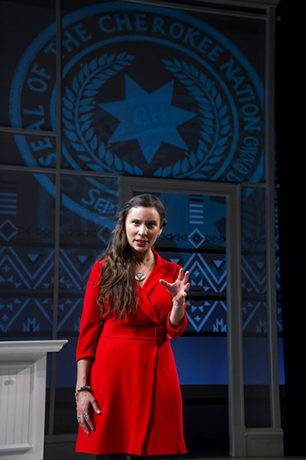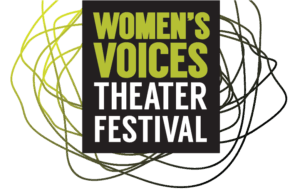Kyla Garcia is starring as Sarah Ridge Polson in Sovereignty at Arena Stage. Sovereignty, by Mary Kathryn Nagle, tells two stories. One is of a modern Native woman (played by Garcia) fighting for her tribe’s rights. The other is of that woman’s ancestors, who made terrible sacrifices to try to keep the Cherokee people free.

Elizabeth Ballou: How did you become interested in theater? What influenced you to become an actress?
Kyla Garcia: I loved to read before I knew how. I would hold newspapers up as a small child and speak gibberish, acting like I could understand the words. Once I learned to read, I never went anywhere without a book. That love of reading got me cast in my first show.
From the moment I realized you could not only read, but re-create stories and share them onstage, I never wanted to be anywhere else. That passion for storytelling brought me to the stage, and I’ve been here ever since.
When both playwrights and actors are trying to understand their characters, one of the most common questions they ask themselves is “What does this person want?”
What does Sarah Ridge Polson [the protagonist of Sovereignty] want?
Sarah Ridge Polson’s dream is to overturn the Oliphant decision [note: the Oliphant decision was a 1978 Supreme Court ruling that declared that Native American courts do not have jurisdiction over crimes committed by non-Natives on tribal land.] The more she fights to implement the Violence Against Women Act (VAWA) within her own community, the more the Cherokee Nation will be able to assert tribal jurisdiction over non-Indians who commit domestic violence crimes.
Protecting women’s bodies and protecting one’s land go hand in hand. Women are the life-givers. If you destroy the divine feminine, you destroy the future of a people. Sarah’s fight to restore the sovereignty of Native women is the first step to restoring the sovereignty of Tribal Nations.
I think Sarah’s ultimate dream is to become the first Native American Supreme Court Justice.
What’s been easiest about portraying her desires and actions? What’s been hardest?
One of the things that has been most challenging about playing her is finding the joy in not being the most likeable character. People who don’t stop to explain themselves can come across as arrogant; confidence is often mistaken for conceit, especially if you are a strong woman. But Sarah is so unapologetically herself. She never feels the need to explain why she does what she does.
That has been a challenge for me because I am someone who constantly thinks of how I will affect others’ feelings before I speak. Sarah speaks way before she thinks. She’s not afraid to be the first to say what needs to be said. For Sarah, it’s about honoring what is true, not how you feel about the truth.
One of the easiest things is how much I relate to her ambition and drive. Sarah has known she was meant to be a lawyer from the moment she could speak, just like I knew my path from the moment I could read. We share that same tunnel vision.
At the Sovereignty discussion, you talked about theater as activism. That really struck me. When did you come to see theater as a way to talk about social injustice? How is activism through theater different from other forms of activism?
There’s something about the sacred distance between the stage and the audience that allows people to think for themselves and want to take action. If we can change the world onstage and screen, we can inspire change in the real world.
I’ve always believed in art as a vital tool for activism, but November 9, 2016, was the day art’s significance hit me in a visceral way. I was working on another one of Mary Kathryn’s plays called Fairly Traceable. The play deals with the effects of climate change on Native communities. It takes place during Hurricane Katrina in 2005, the Joplin tornado in 2011, and the not-so-distant future, when many of America’s coastal cities have sunk into the sea.
I remember being at the reading on the day after the election and feeling the reality of a world where we could actually lose Manhattan because we had leaders who sincerely believe that climate change isn’t real. It horrified me. It also inspired me. From that moment forward, it became more important than ever to me to use theater as a form of protest and resistance.
What do you hope the audience learns from this play? From Sarah Ridge Polson?
I hope the audience learns how our past and present are inevitably intertwined. If we don’t look at our collective historical trauma with transparency and courage, the past repeats itself. It’s up to us as a country to dismantle the broken systems that have been put in place.
I hope the audience is left with a desire to be involved in any way they can, whether that’s participating in an open dialogue or voting for leaders who seek to empower disenfranchised, vulnerable Native communities who continue to suffer because of broken treaties.
One of our cast members, Dorea Schmidt, made a beautiful point when we were visiting the National Museum of the American Indian together. She said that the foundation Native communities built after colonization was like giving a group of people broken tools and supplies and asking them to build the same structures that other groups of people with shiny, new tools and supplies were building, and then yelling at them when they didn’t do it fast enough.
The more we educate ourselves on this history, the sooner Native communities will finally be given the proper tools (such as policies, protection, and resources) they’ve deserved since their land was stolen from them.
I also hope audiences see that Native women are not invisible. Indigenous women experience the highest rates of domestic violence and sexual assault in the United States. There are so many missing indigenous women in the world that Native communities do not have the resources to reflect the actual statistics. We can’t heal this if people don’t know.
Tell me about rehearsal. What have you discovered about yourself while working on this show?
Rehearsal has been an amazing experience. Molly Smith is a visionary, and the entire Arena team is a joy to work with.
I’ve learned that making time to have fun with my cast mates serves our common goal. We’ve become a family. It’s inspiring to know that no matter how isolating the rehearsal process can be, I’m never alone. This team always has my back. And I have theirs.
If you could invite anyone to see this show, who would it be?
When I’m not acting, I spend most of my time writing poetry, so I would invite Joy Harjo. She is my favorite Native poet and wrote one of my all-time beloved poems, “I Give You Back.” Joy uses the shadows of the past to illuminate the light, which is what I feel our play does. She is a healer, and her medicine is words.
Mary Kathryn’s words possess a healing power as well. It would be a gift to share the play with Joy and see what happens when these two healing storyteller-powerhouses get in the same room.
What is the best way for audience members and allies to support Native women who are trying to reclaim sovereignty over their bodies?
Do you have a minute? Because I’ve got a few suggestions!
- Check out the official site of the National Indigenous Women’s Resource Center at www.NIWRC.org to learn more and donate to help fight for Native Women.
- Vote for leaders who will support the upcoming reauthorization of VAWA so that it continues to have a tribal jurisdiction provision in it. You can also call your local senators and representatives to voice concerns for VAWA’s reauthorization.
- Visit the National Museum of the American Indian and educate yourself at the “Nation to Nation” treaty exhibit.
- Continue to support Mary Kathryn Nagle, who is one of the biggest advocates for Native women’s rights, by encouraging friends to come see our play! The more people we get to see this show, the more the demand for Native stories will be felt. The more authentic Native stories in the world, the more we can reframe the narrative. It is up to us to rewrite history, one truth at a time.
Sovereignty is playing through February 18, 2018, as part of the Women’s Voices Theater Festival at Arena Stage – 1101 Sixth Street SW, in Washington, D.C. For tickets call (202) 488-3300 or go online.

Mary Kathryn Nagle is an enrolled citizen of the Cherokee Nation. She currently serves as the executive director of the Yale Indigenous Performing Arts Program. She is also a partner at Pipestem Law, P.C., where she works to protect tribal sovereignty and the inherent right of Indian Nations to protect their women and children from domestic violence and sexual assault. She has authored numerous briefs in federal appellate courts, including the United States Supreme Court. She has received commissions from Arena Stage, The Rose Theater in Omaha, Nebraska, Portland Center Stage, and Denver Center. Her other plays include Manahatta, Diamonds, Waaxe’s Law, Sliver of a Full Moon, My Father’s Bones, Miss Lead, and Fairly Traceable.






